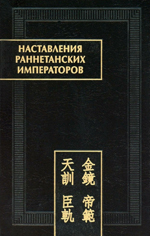|
|
| |

|

|
The Family Precepts of Early Tang Emperors [Наставления раннетанских императоров] / Translation from Chinese, commentaries, analysis and appendices by I.F. Popova; Russian Academy of Sciences, Institute of Oriental Manuscripts (Asiatic Museum). Moscow: Nauka — Vostochnaya literatura, 2022. 310, [2] p. (Pamyatniki pismennosti Vostoka; CLIX). ISBN 978-5-02-039882-5
This book presents a Russian translation of writings on the problems of government attributed to the early Tang Emperors Taizong (627–649), Gaozong (650–683), and Empress Wu Zetian (684–704). The treatises written in their names belong to the “family precepts” (jia xun) genre or the distinctive genre of the “imperial family precepts” (huangdi xun jie), which came into being specifically during the early Tang era.
The significance of relations between the ruler and his dignitaries increased significantly in the political ideology of the Tang dynasty. The dialogue between the emperor and his enlightened and highly intellectual councillors became a major impetus for the government of the state. The Tang ideology expended great efforts in search of logical means of understanding politics, on the development of categories and concepts that might correspond in full measure to the new level of understanding of power and the administration of the state. The tendency, inherent in Chinese ideology since ancient times, to find a rationale for current political decisions in the events of past history acquired a more definite pragmatic character. The status-related tasks of those in power—the emperor himself, his relatives, senior officials and functionaries—were concretized considerably. The propagation of the “imperial family precepts” under the early Tang also had much to do with the new style of imperial rule.
 PDF-files PDF-files
Front matter, summary
Keywords
Golden mirror
Heavenly instructions
Models for an emperor
Pathways of ministers
Tang period
|
|
|
|
Random news: Announcements |
|
The 19th Conference “Current Issues of Buddhological and Indological Studies” will be held at the IOM RAS on July 14, 2025. The conference program is now available. |
|
Read more...
|
|
|
|
|

